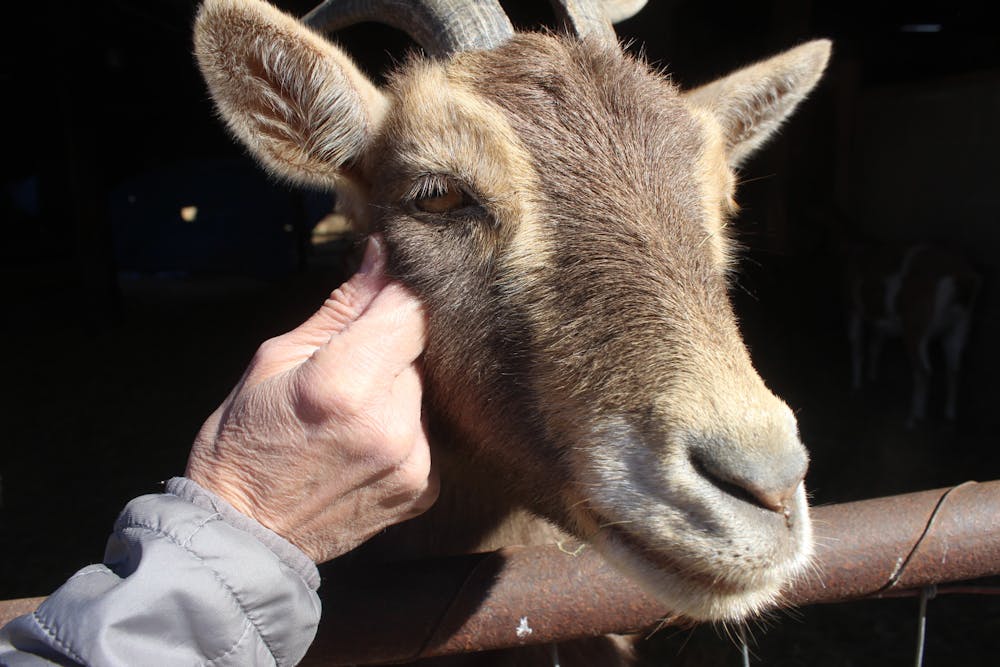In 2016, two couples were searching for a change of life and the opportunity to create something they felt was meaningful and authentic.
Nicole Schoneman, her partner Mark Veldman, Josh Jackson and his partner Tonya Plachy decided to embark on a trek of ranching goats, producing goat cheese and crafting goat milk soap. Schoneman, Veldman, Jackson and Plachy are equal co-owners of the farm. Schoneman made cheese and soap, and Jackson and Plachy manage the farm and take care of the animals.
Nestled off the winding hills on the outskirts of Bloomington’s east side, “The Goat Conspiracy” built up a herd of over 150 goats and almost 70 chickens.
“The Goat Conspiracy” spent seven years hosting soap workshops, offering goat yoga classes, leading educational farm tours and even an onsite vacation rental cabin. They sold dairy-based products made in their onsite creamery.
That was until the end of 2023, when the farm chose to take an alternative route.
“I started having discomfort with being a part of it,” Nicole Schoneman said. “When you’re doing dairy, and even doing dairy very well, there are certain gaps that you can’t close.”
The Food and Agriculture Organization of the United Nations Global Livestock Environmental Assessment Model published “Pathways toward lower emissions” in 2023, which revealed that, based on data from 2015, the livestock supply chain contributed a 12% share of total greenhouse gas emissions.
“We were pretty naive going into it,” Schoneman said. “We care about sustainability. We're doing local food. We care about animals. We care about community. We care about education. They are all reasons that instigated what we did, but realizing the environmental impact is one thing, the other is the treatment of animals.”
Over the course of its business, “The Goat Conspiracy” learned how much death was involved in the production of dairy products and animal agriculture altogether.
According to “Animal lives embodied in food lost and waste,” almost 18 billion animals were killed where the meat was lost and wasted somewhere along the food supply chain in 2019. The data accounted for animals in the six major meat-producing species: cattle, goats, pigs, sheep, turkey and chicken.
“The Goat Conspiracy” also felt irresponsible for continuously breeding goats for milk production, Schoneman said.
“Doing dairy, even doing it as well as we could, we were making it seem like dairy is OK,” Schoneman said. “Not everyone knows how the majority of cheese is made, the impact on the environment and the impact on the animals.”
“The Goat Conspiracy” doesn’t keep animals under the same conditions that typical factory or industrial agriculture farms do, Schoneman said.
Schoneman explained that her partner and the two farm hands each had their own individual reasons for deciding to stop producing dairy. “The Goat Conspiracy” shared their decision in an October 2023 Facebook post. The farm would continue making cheese until its current “milkers dried up,” and soap until it ran out of its frozen supply. But after that, it would be done with dairy production.
The farm had to come up with a plan for the next step.
“There was no way we were going to get rid of the goats,” Schoneman said. “We decided a sanctuary was a good idea.”
Now known as “The Goat Conspiracy Sanctuary and Retirement Home,” the farm is working toward getting its 501(c) 3 status to officially become a non-profit. “Peak Animal Sanctuary” from Freedom, Indiana, is serving as the fiscal partner for “The Goat Conspiracy” through the process, and the sanctuary is working on finding a director for its three-member board.
“Even when we were continuing the business, we had no intentions of sending the milking goats when they were done to the slaughter. That just seems brutal,” Schoneman said. “We get them pregnant, and they milk, milk, milk. Then they’re useless and that’s just terrible.”
The sanctuary aims to help people connect to the farm animals on a personal level, like they do with companion animals. “The Goat Conspiracy” wants the sanctuary to be a space which is both nonjudgmental and educational. Schoneman explains they are taking a “reducitarian” approach.
“I don’t want people to feel like they have to be vegan to come here,” Schoneman said. “The goal is to reduce the consumption of animal products, allow for people to make connections with animals and bridge that understanding.”
Instead of giving the milking and pasteurization equipment to a different dairy, “The Goat Conspiracy” is finding ways to repurpose their supplies. The solar-powered dairy will be renovated into a plant-based commercial kitchen, a space for the “Planted Bloomington” food truck, which had its soft opening in September 2023.
The food truck is owned by Nicole Schoneman with a menu designed by Erika Yochum, who was the owner and operator of Bloomington’s “Oona” formerly known as “Feast Cafe” which closed in 2019. The truck aims to only cook with local and in-season ingredients, all menu items have the option to be gluten free and their completely plant-based dishes are served without any single-use plastics.
While “Planted Bloomington” will use the commercial kitchen on-site at the Bloomington farm, the food truck is a separate entity from the sanctuary.
As “The Goat Conspiracy” transitions into its new sanctuary model, goat yoga classes will continue, as will the option to schedule farm tours. The sanctuary will host a classical music concert in the summer and hopes to expand the opportunities it has for more events in the future.
CLARIFICATION: This story has been updated to clarify Josh Jackson and Tonya Plachy are also equal co-owners of the farm.




